Hi all!
I’m hoping someone here can help me out.
The other day my sister and I found (from what we can tell) an older fledgling or juvenile Amazon parrot hiding in the crevice between our fence and the curb of our carport. He was clearly in distress and not doing well. After we took him in and gave him some food and water however it became clear that he was just dehydrated and starving. (We don’t know the sex, so for the sake of ease we refer to the parrot as a “he”.)
We’ve name him Mojo. We’re not sure if he is a yellow crowned Amazon or a blue fronted. He’s got a couple of small turquoisey green bits above his beak (see attached photos). He’s still a pretty messy eater and still a bit clumsy so I’m thinking he’s weaning or was just weaned. He’s able to eat on his own, but not super well and has trouble with certain foods (especially if they are hard) but once I hand feed him that food a bit, he has an easier time with said food. So I’m thinking 14-18 weeks or so. This is just a guess from the research I’ve done, please correct me if I’m wrong.
One thing we’re not sure about is whether he is captive bred or wild. We have flocks of Amazons that live around us (we’re in Southern California) and have been in the middle of a heat wave which would explain why little Mojo was in trouble.
We’ve taken him to the exotic vet near us and he is not microchipped. We also took him to the local humane society to determine whether he is wild or not. They were both unable to tell us if he is wild but from his tame behavior they think not. The humane society said that all of their wild parrots have different markings and will scream at anyone who comes close to their cage.
So my question is, is it easy to tell the difference in behavior between a captive and wild Amazon at such a young age? Could he be acting so friendly as a defense mechanism/because we are feeding and caring for him? I do most of the handling of him, but he seems unphased by the rest of the family (and even when our small dogs sneak in under foot).
He lets me handle him, and stays calm when I arrange things in his cage while he’s in it. He seems to have little fear of us and is quite comfortable on our hands, arms or shoulders.
The only noises he makes (aside from the initial hiss when we were rescuing him outside) are three clucks in succession which he normally only does if we’re in the room. If he’s hungry or we are talking to him his clucks get louder and more persistent (almost like honking).
I’ve even been able to teach him to step up onto my hand and step down in the few days we’ve had him. He’s not as quick to step down yet.
We found a place in San Diego (which is about 2.5 hrs away) that rehabilitates wild parrots, but they don’t accept parrots unless they are certain they are wild. Is there a way to be certain?
If he is not wild and we are unable to find his owner, then we are considering keeping him. We have a lot of experience with animals and birds (we have rehabilitated birds in the past but nothing as complex as a parrot) and understand the challenges of taking on a parrot so would not be taking this decision lightly.
Sorry for the essay guys, but I thought I’d give you as much information as possible in order to be able give me an informed opinion.
Any advice/help you can offer would be much appreciated!
TLDR; we found a weaning or juvenile parrot. We aren’t sure if he is wild but he seems tame. We are looking for his owners and will likely keep him if we can’t find them. Any advice is appreciated.
We’ve taken him to the exotic vet and humane society and have posted on parrotalert911, parrotalert, the found section on this forum and craigslist. I have also searched the lost section of all those sites as well to no avail. We will put out some flyers in our neighborhood this weekend.
I’m hoping someone here can help me out.
The other day my sister and I found (from what we can tell) an older fledgling or juvenile Amazon parrot hiding in the crevice between our fence and the curb of our carport. He was clearly in distress and not doing well. After we took him in and gave him some food and water however it became clear that he was just dehydrated and starving. (We don’t know the sex, so for the sake of ease we refer to the parrot as a “he”.)
We’ve name him Mojo. We’re not sure if he is a yellow crowned Amazon or a blue fronted. He’s got a couple of small turquoisey green bits above his beak (see attached photos). He’s still a pretty messy eater and still a bit clumsy so I’m thinking he’s weaning or was just weaned. He’s able to eat on his own, but not super well and has trouble with certain foods (especially if they are hard) but once I hand feed him that food a bit, he has an easier time with said food. So I’m thinking 14-18 weeks or so. This is just a guess from the research I’ve done, please correct me if I’m wrong.
One thing we’re not sure about is whether he is captive bred or wild. We have flocks of Amazons that live around us (we’re in Southern California) and have been in the middle of a heat wave which would explain why little Mojo was in trouble.
We’ve taken him to the exotic vet near us and he is not microchipped. We also took him to the local humane society to determine whether he is wild or not. They were both unable to tell us if he is wild but from his tame behavior they think not. The humane society said that all of their wild parrots have different markings and will scream at anyone who comes close to their cage.
So my question is, is it easy to tell the difference in behavior between a captive and wild Amazon at such a young age? Could he be acting so friendly as a defense mechanism/because we are feeding and caring for him? I do most of the handling of him, but he seems unphased by the rest of the family (and even when our small dogs sneak in under foot).
He lets me handle him, and stays calm when I arrange things in his cage while he’s in it. He seems to have little fear of us and is quite comfortable on our hands, arms or shoulders.
The only noises he makes (aside from the initial hiss when we were rescuing him outside) are three clucks in succession which he normally only does if we’re in the room. If he’s hungry or we are talking to him his clucks get louder and more persistent (almost like honking).
I’ve even been able to teach him to step up onto my hand and step down in the few days we’ve had him. He’s not as quick to step down yet.
We found a place in San Diego (which is about 2.5 hrs away) that rehabilitates wild parrots, but they don’t accept parrots unless they are certain they are wild. Is there a way to be certain?
If he is not wild and we are unable to find his owner, then we are considering keeping him. We have a lot of experience with animals and birds (we have rehabilitated birds in the past but nothing as complex as a parrot) and understand the challenges of taking on a parrot so would not be taking this decision lightly.
Sorry for the essay guys, but I thought I’d give you as much information as possible in order to be able give me an informed opinion.
Any advice/help you can offer would be much appreciated!
TLDR; we found a weaning or juvenile parrot. We aren’t sure if he is wild but he seems tame. We are looking for his owners and will likely keep him if we can’t find them. Any advice is appreciated.
We’ve taken him to the exotic vet and humane society and have posted on parrotalert911, parrotalert, the found section on this forum and craigslist. I have also searched the lost section of all those sites as well to no avail. We will put out some flyers in our neighborhood this weekend.
Attachments
-
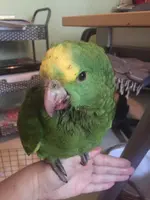 5E309160-BF5C-4E5F-A2F4-1CF4F27B1D77.webp98.4 KB · Views: 287
5E309160-BF5C-4E5F-A2F4-1CF4F27B1D77.webp98.4 KB · Views: 287 -
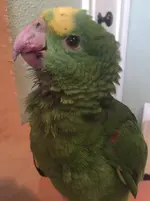 F8AAFA87-F976-4FFC-97D9-0B4F6CD171F4.webp98.9 KB · Views: 305
F8AAFA87-F976-4FFC-97D9-0B4F6CD171F4.webp98.9 KB · Views: 305 -
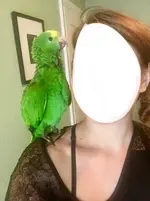 CE9FF14E-EA6D-4AFF-8B8F-23585F0BB810.webp59.5 KB · Views: 215
CE9FF14E-EA6D-4AFF-8B8F-23585F0BB810.webp59.5 KB · Views: 215 -
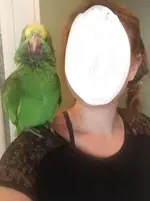 66C4D64C-7131-4BCF-8839-CFD585823774.webp43.8 KB · Views: 214
66C4D64C-7131-4BCF-8839-CFD585823774.webp43.8 KB · Views: 214 -
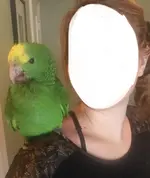 E030436C-F558-4EA8-8B9D-EE6391788F1C.webp38.8 KB · Views: 239
E030436C-F558-4EA8-8B9D-EE6391788F1C.webp38.8 KB · Views: 239
Last edited:

